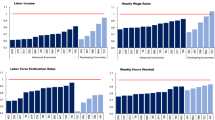Abstract
This study reports findings of gender differences in tax attitude changes influenced by better tax knowledge. Male students are more exposed to tax knowledge in a way that makes them reconsider more easily their attitudes towards their own tax evasion, i.e. tax ethics, than their female peers. Male students get a significantly stricter attitude towards their own tax evasion. On the other hand, female students are more exposed to tax knowledge in a way that makes them reconsider their attitude towards other people's tax evasion than their male peers, i.e. they get a significantly stricter attitude towards others tax evasion. Improved tax knowledge significantly changed both male and female students attitude towards the fairness of the tax system, i.e. they considered the tax system to be more fair. Implications for ethical behaviour of taxpayers are highlighted.
Similar content being viewed by others
References
Alm, J.: 1991, 'A Perspective on the Experimental Analysis of Taxpayer Reporting', The Accounting Review 66, 577–593.
Betz, M., L. O'Connell and J. M. Shepard: 1989, 'Gender Differences in Proclivity for Unethical Behavior', Journal of Business Ethics 8, 221–224.
Boldt, R. F.: 1983, Status of Research on Item Content and Differential Performance on Tests Used in Higher Education (Educational Testing Service, Princeton, NJ). Cited in McLarty, Noble and Huntley (1989).
Bouillon, M. L. and B. M. Doran: 1992, 'The Relative Performance of Male and Female Students in Accounting Principles Classes', Journal of Education for Business (March), 224–228. Cited in Gossweiler and Slevin (1995)
Burke, P. J.: 1989, 'Gender Identity, Sex, and School Performance', Social Psychology Quarterly 52, 159–169.
Burke, P. J. and J. W. Hoelter: 1988, 'Identity and Sex-Race Differences in Educational and Occupational Aspirations Formation', Social Science Research 17, 29–47.
Busch, T.: 1995, 'Gender Differences in Self-efficacy and Academic Performance among Students of Business Administration', Scandinavian Journal of Educational Research 39, 311–318.
Chipman; S. F., S. P. Marshall and P. A. Scott: 1991, 'Content Effects on Word Problem Performance: A Possible Source of Test Bias?', American Educational Research Journal 28, 897–915.
Cook, T. D. and D. T. Campbell: 1979, Quasi-Experimentation. Design & Analysis Issues for Field Settings (Houghton Mifflin Company, Boston).
Eriksen, K. and L. Fallan: 1996, 'Tax Knowledge and Attitudes towards Taxation: A Report on a Quasi-Experiment', Journal of Economic Psychology 17, 387–402.
Fallan, L.: 1995, Gender, Exposure to Tax Knowledge, and Test Performance. Paper presented at The 19th Annual Congress of the European Accounting Association, Bergen, May 2–4, 1996.
Fallan, L. and K. Eriksen: 1993, På ære og samvittighet. Om årsaker til skatteunndragelser. [Upon my honor. About causes of tax evasion.] School of Economics and Business Administration, Sør Trøndelag College. Paper presented at FIBE X, Norwegian School of Economics and Business Administration, Bergen, January 6–7, 1993, and at the Nordic Business Economy Conference at the University of Lund, Sweden, August 18–20, 1993 [Language: Norwegian].
Gossweiler, R. S. and K. F. Slevin: 1995, 'The Importance of Gender in the Assessment of Historical Knowledge', Research in Higher Education 36, 155–175.
Jackson, B. R. and V. C. Milliron: 1986, 'Tax Compliance Research: Findings, Problems, and Prospects', Journal of Accounting Literature 5, 125–165.
Kinsey, K. A. and H. G. Grasmick: 1993, 'Did the Tax Reform Act of 1986 Improve Compliance? Three Studies of Pre-and Post-TRA Compliance Attitudes', Law & Policy 15, 293–325.
Laurin, U.: (1986), På heder och samvete. Skattefuskets orsaker och utbredning (Norstedts Forlag, Stockholm).
Lewis, A.: 1982, The Psychology of Taxation (Martin Robertson, Oxford).
McLarty, J. R., A. C. Noble and R.M. Huntley: 1989, 'Effects of Item Wording on Sex Bias', Journal of Educational Measurement 26, 285–293.
Nunnally, J. C.: 1978, Psychometric Theory. 2nd edn. (McGraw-Hill, NY).
Reve, T.: 1985, 'Validitet i økonomisk-adminitrativ forskning', in Metoder og perspektiver i økonomiskadminitrativ forskning. Norwegian School of Economics and Business Administration, Bergen, NHH/RSF, Universitetsforlaget.
Roberts, L. H., P. A. Hite and C. F. Bradley: 1994, 'Understanding Attitudes toward Progressive Taxation', Public Opinion Quarterly 58, 165–190.
Rogers, E. M.: 1983, Diffusion of Innovations (Free Press, New York).
Ruegger, D. and E.W. King: 1992, 'A Study of Effect of Age and Gender upon Student Business Ethics', Journal of Business Ethics 11, 179–186.
Schmölders, G.: 1970, 'Survey Research in Public Finance – A Behavioral Approach to Fiscal Theory', Public Finance, 300–306.
Skaalvik, E. M. and R. J. Rankin: 1990, 'Math, Verbal, and General Academic Self-Concept: The Internal/External Frame of Reference Model and Gender Differences in Self-Concept Structure', Journal of Educational Psychology 82, 546–554.
Song, Y. D. and T. E. Yarbrough: 1978, 'Tax Ethics and Taxpayer Attitudes: A Survey', Public Administration Review 38, 442–452.
Spicer, M. W.: 1975, 'New Approaches to the Problem of Tax Evasion', British Tax Review, 152–154. Cited in A. Lewis (1982).
Spicer, M. W. and S. B. Lundstedt: 1976, 'Understanding Tax Evasion', Public Finance 31, 295–305.
Vogel, J.: 1974, 'Taxation and Public Opinion in Sweden: An Interpretation of Recent Survey Data', National Tax Journal 28, 499–513.
Wonnacott, T. H. and R. J. Wonnacott: 1990, Introductory Statistics for Business and Economics, 4th edn. (John Wiley & Sons, NY).
Author information
Authors and Affiliations
Rights and permissions
About this article
Cite this article
Fallan, L. Gender, Exposure to Tax Knowledge, and Attitudes Towards Taxation; An Experimental Approach. Journal of Business Ethics 18, 173–184 (1999). https://doi.org/10.1023/A:1005711905297
Issue Date:
DOI: https://doi.org/10.1023/A:1005711905297




